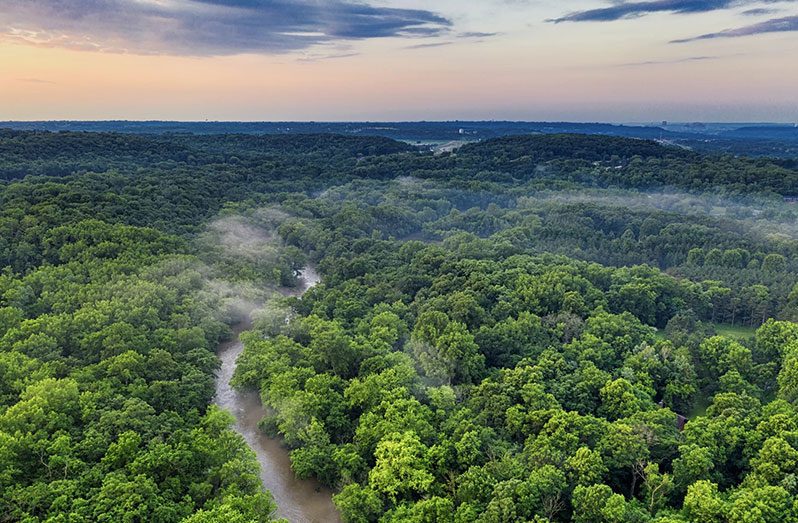–Forestry Commission affirms; debunks Kaieteur News article on ‘falsehoods’ related to concessions, projects within the sector
Below is the full statement from the Guyana Forestry Commission in response to a recent Kaieteur News article:
“THE Guyana Forestry Commission (GFC) takes this opportunity to clarify the management of the country’s forestry sector following an erroneous article published by Kaieteur News on July 25, 2023.
The article in question is a product of the publisher’s many deceptive rants titled, “Foreign companies ‘raping’ Guyana’s gold and forestry sectors.” The piece is laced entirely with inaccuracies aimed at misleading the Guyanese people in a sensationalist attempt to boost paper sales.
Firstly, it is extremely false to spew that foreign companies operating in Guyana’s forestry sector are awarded contracts to construct roads and bridges while simultaneously “exploiting” the nation’s resources. Further, it is an equally damaging falsehood to say that those companies are, in turn, barring locals from “setting foot” on the roads and bridges.
We wish to categorically state that no foreign company operating in the forestry sector has ever been given a contract to build roads and bridges. Companies, both foreign and local, develop roads within their concessions for their own private use.
This has been a long-standing tradition. Most of the roads used by forestry-related companies are built and maintained by the Government of Guyana.
Readers may recall that as part of Budget 2023 – a whopping $781.9 billion and Guyana’s largest budget ever passed – over $4 billion was allocated to build, upgrade and maintain hinterland roads and bridges.
In keeping with procurement requirements, all projects were publicly advertised with the contracts publicly awarded by the National Procurement and Tender Administration Board (NPTAB).
Further to this, a major road corridor – the US$190 million Linden to Mabura road network is being constructed by the government, along with new bridges from Linden to Kurupukari. These road networks are open to all Guyanese and foreign companies operating in all sectors and are part of the government’s transformative agenda of enhancing infrastructure across the country.
The newspaper and its publisher also fallaciously stated that foreign companies are given duty-free privileges to conduct [their] large operations. Kaieteur News and its publisher should be well aware that all heavy-duty equipment such as log loaders, skidders, bulldozers, among others, that [are] utilised in the forestry and other sectors are duty-free.
Hence, no special privileges are given to foreigners, or as a matter of fact, any company. Duty-free concessions on heavy-duty equipment are legally obtained and can be accessed by any individual or company foreign or local operating in Guyana.
The Guyana Revenue Authority is responsible to affording these concessions. The GFC wishes to set straight, as well, that there are over 550 concession holders, small and large, operating in the logging sector.
Currently, there are only five foreign companies holding concessions in the forestry sector. Added to this, the current level of production is way below the threshold or allowable cut, thereby debunking the deceptive statement that the resources are being exploited.
Guyana has one of the best forest management systems globally and the rate of deforestation is among the lowest in the world. Had it not been for Guyana’s low level of deforestation, along with prudent forestry management practices, Guyana would not have been able to secure a lucrative space in the carbon credit market.
Readers may recall that, in December last year, 33.5 million tonnes of carbon credits were certified and placed on the market for sale. This was soon followed by the sale of credits valuing a minimum of US$750 million to Stabroek Block Partner, Hess Corporation.
A portion (15 per cent) of these funds has already been made available to Indigenous villages for livelihood activities, thereby transforming the lives and economic sustainability of hinterland villages across Guyana.
This singular benefit alone contradicts Kaieteur News’ mischievous assertion that there is disregard for the welfare of the Guyanese people and that the nation’s citizens “struggle to secure a meal.”
In light of the foregoing, the GFC, and, by extension, the Ministry of Natural Resources, encourage Kaieteur News, and in particular its publisher, to kindly reach out to the respective entities to seek facts pertaining to the management of Guyana’s natural resources sector. The ministry remains accessible and transparent to all those who seek information.”



.jpg)








